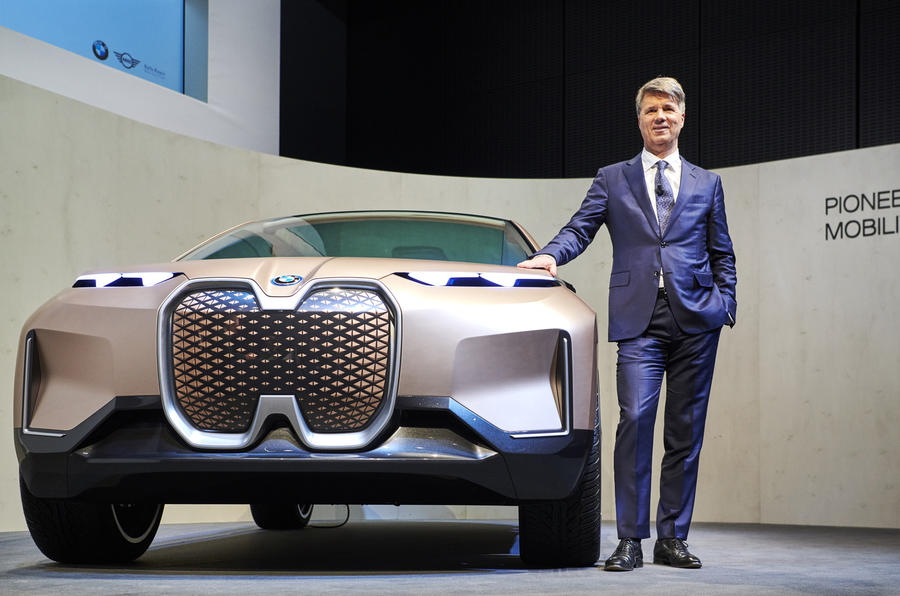The BMW Group has warned that it expects profits to fall this year due to 'challenging' business conditions, but it has also said that it's on course to help shape ‘premium mobility’ in the areas of electrification and autonomy.
The German firm recorded a pre-tax profit of £8.4 billion in 2018, an 8.1% decline on 2017 despite a slight 1.1% increase in sales across its BMW, Mini and Rolls-Royce brands. As with other car firms, it was hit by challenges including the market downturn in China, the introduction of the WLTP emission regulations, the threat of trade wars and political uncertainty including Brexit.
BMW finance boss Nicolas Peter said the firm’s 2018 performance “did not meet our usual high standards” and warned that “significant currency and commodity headwind” mean BMW anticipates pre-tax profits will fall further this year.
BMW is currently in the midst of implementing its Number One > Next strategy, designed to restructure the business for the future, including investment in electrification, autonomy and connectivity. BMW said the efficiencies introduced by the plan would lead to £10.3bn of cost cuts, achieved through increased digitalisation of design and development. No jobs are due to be affected.
The plan also involves a focus on new models and powertrains. BMW will launch 20 new and updated models this year, including plug-in hybrid versions of the 3 Series, 7 Series, X3 and BMW X5. The electric Mini SE hatchback will also go on sale this year, with the BMW iX3 following in 2020. The i4 and iNext will follow in 2021, with 12 electric cars due to launch by 2025.
BMW is focusing on two new flexible vehicle platforms, and it says that will lead to it cutting up top 50% of its current drivetrain variants, enabling it to “focus on the products most in demand". The firm also says it will reduce the complexity of its portfolio, likely by trimming less profitable model lines. It has confirmed that it won't replace the BMW 3 Series Gran Turismo.
BMW chairman Harald Krüger said: “We remain firmly on course, having established a strong position as one of the world’s top providers of e-mobility”, adding that BMW is “firmly setting its course for the future”.
Read more
First drive: 2019 Mini Cooper SE










Join the debate
Add your comment
German car lol
That will still sell. Look at some of the crap Bmw’s they’ve sold before. Cmon the 1series looked like a Hyundai and had the worst engine failures bit wannabes still bought them. Look at the new Mercs Ugh. But their finance deals make them popular and fashionable with wannabes. I hate to admit that Audi’s somehow has managed to retain their style.
My personal opinion
My personal opinion and that design sucks, I didn't like the new BMW. But I repeat this is just my personal opinion, maybe someone else would like to drive such a car.
BMW...and Germany
When are you going to drop that absurd grille?
On the subject of manufacturing - this is why Germany was incredibly close to going into recession in the last quarter (and only escaped it because January has 31 days!). There is a global downturn in purchasing. Any country which focuses on manufacturing is suffering, so Germany...
When Italy crashes (could be next month or next year), this will cause French banks to collapse, as it is they (outside of all the Italian banks) who have funded Italy's incredible debt to the tune of €2.3 TRILLION. When the French banks collapse, so will France...and the Euro currency. A crash will immediately kick in and people will stop buying goods that are made in... So Germany will crash... and the EU will collapse. If this coincides with Ireland's future borrowing requirement of €80 billion (yes, that's right - little is said about it, but Ireland's tax receipts to its debt repayments is MINUS 46.9%!!!). While the UK has a POSITIVE net international investment position of $575 billion, Ireland has a MINUS of $439 billion!!! In the past, Germany might have been in a position to fund that (with others), but a political change (the demise of Merkel) and Germany's increasingly shaky economic position means they literally won't be able to fund it. So you won't want to be in Ireland when that hits the fan.
So what does all this mean? It means that Germany is spent. With a possible recession looming, and a crash caused by Italy's impending exit from the Euro, and Italy bringing about the collapse of the EU (yep, EU collapse from the effects of Brexit not required), there's going to be no one buying much. And any country who has based manufacturing as their economic foundation is going to suffer. And I feel I should point out that this is yet another reason why we have to be outside of the EU by then. We'll be affected even on the outside, but the effects on us if we're still in would be incalculable. The good news is that from the ashes of what was the EU will rise a trading partnership with no political affiliations, and no common currency...as it should have remained...the Common Market (EEC).